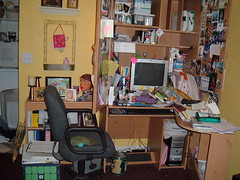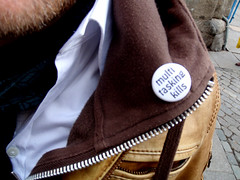Detecting Procrastination
Each time you try to convince yourself that there will be a better time other than "now", you are about to start procrastinating.
Instead of asking "when would be a better time to do this?" ask "what can I do now?"
Positives of negative New Year's resolutions
By this time most of us (at least those who care to make our lives better) have made their New Year’s resolutions. From what I hear here and there most of these resolutions are around new things which you are going to do this year:
- work out regularly
- read more books
- spend more time with family
- improve foreign language skills
- etc.
As you see all of these resolutions are about new things in your life, they are about doing things you did not do before. However, there is another popular resolution, which is, in a sense, exactly opposite:
- quitting smoking
This resolution is about not doing something, thus creating a room for new things in your life. Indeed, ten 5 minute smoking breaks give you 50 extra minutes each day, when you get rid of this bad habit. Extra bucks that you save on not buying cigarettes give you additional opportunities to do something meaningful to you and those around you. And this is not mentioning your health and wellbeing. At the end this negative resolution creates additional time and resources capacity you need so much to act on your positive resolutions.
I believe that each positive New Year’s resolution should be complimented by a negative one, which will make it possible to do what you resolved to do.
If last year you spend substantial amount of time fixing and reworking what your subordinates did, you need to resolve to stop doing that and instead focus on improving their skills to avoid those reworks in the first place.
If last year you engaged in many activities simply because somebody asked you and technically you can do that (and, between us, do well), you need to stop doing that and make your own conscious decisions about what you do and what you don’t.
We only have 24 hours a day and we always use them up. Each day. In order to start doing something, you need to take time from something else. Unfortunately, we can not create time out of nowhere.
About productivity in Ukrainian
A friend of mine, Alexander Babich, started a new blog about productivity - ProductivyBlog.com.ua (in Ukrainian). I've been following another his another blog for ages and every so often I've learned about new useful tools and approaches, which changed the way I do things and changed for better. If you understand Ukrainian this blog is well worth checking out.
Multitasking kills
Did not I told you that multitasking is evil? Gauge your distraction to see it yourself! Multitasking is like using "all seasons" tires: they drive equally bad in summer and in winter. When you multitask, all of your activities end with equally bad result.
Less is more
 Some time ago I've posted a couple of ideas around productivity and distractionless computer environment. Since then I continue trying to optimize my computer experience here and there.
It is always interesting to know what ideas others have about problems you are thinking about. So it was very interesting for me to read how Leo Babauta of Zen Habits approaches his computer experience. A lot of good ideas there.
Some time ago I've posted a couple of ideas around productivity and distractionless computer environment. Since then I continue trying to optimize my computer experience here and there.
It is always interesting to know what ideas others have about problems you are thinking about. So it was very interesting for me to read how Leo Babauta of Zen Habits approaches his computer experience. A lot of good ideas there.
Iconless desktop. Great idea! Desktop is not a junkyard. On Windows XP it is as simple as right-click on the desktop -> Arrange Icons By -> Show Desktop Icons.
"Light" menubar. Now I switched from autohiding my Task Bar to completely removing it from the screen: only 2 pixels at the top of the screen. No more annoying appearances of the Tool Bar when your mouse is near the edge. You can still use Win-key to access the Start menu and Alt-Tab to switch between windows.
Keyboard shortcuts instead of icons. Brilliant! This is something that I started adopting very actively. On Windows XP you do not even need to install additional software tools: right-click on the icon in the Start Menu -> Properties, click in the Shortcut key box and select shortcut for an application.
Find your way to effective computer experience.These and other small tricks can take you one step away from chaos and give you some precious time to do what you do best - create!
Use time wisely
Could not resist posting this quote by Lee Iacocca:
"The ability to concentrate and to use your time well is everything if you want to succeed in business - or almost anywhere else for that matter."
(via Happy-PM)
Productive time spans
 Right now I'm really into staying focused on the things I need to accomplish. Most of my work time I spend at my computer and as you might have noticed from my recent posts I try to make it more rewarding experience.
Right now I'm really into staying focused on the things I need to accomplish. Most of my work time I spend at my computer and as you might have noticed from my recent posts I try to make it more rewarding experience.
If you are also interested in that you may benefit from rebooted 43 folders podcast by Merlin Mann. Merlin gives solid advice on getting some time to focus and produce. This advice basically consists of two messages:
- Have some kind of a "box" to put there some stuff to get back to later.
- Go offline to concentrate.
I'm absolutely aligned with the second message and kind of advocate the same approach. The first one is little bit more tricky. Not only should you have a box to put ideas, tasks and todo items but you need to actually get back to this box.
Getting back to stuff is not easy. Especially if what you need to get back to is not the most pleasant activity. Your need to have guts and discipline to regularly go through items in the box and cleanup it. At first it was not easy for me, but over time I get better and better at this.
Happy cleaning!
Full speed mode
A while back I wrote about using full screen to enhance your productivity and focus on the task you need to accomplish. But that is not enough - you need to get rid of blinking, screaming and beeping everything. Here are a few recipes that I follow personally.
Most likely you use Outlook as I do. Outlook has incredible concentration killer - Desktop Alter. I would not say you should disable it, I would say you must disable it! Here is how my notification settings look like
That's right, I do not get any notifications. I want to decide when to read process e-mail myself. I'll talk later about processing e-mail.
Next thing is IMs. Now, don't get me wrong instant messaging is really great. You can distract people from what they are doing all over the world (and, yes, you can use messengers to communicate). Usually IM tools are smart enough to have a "Do not disturb" mode. In this mode all inbound communication will just accumulate without letting you know and you will be able to process it later. And to not forget to turn of sound notification on incoming messages.
There are so many ways to get distracted, but there equally as many to protect yourself from distraction. Before you skip to the next web page check out this.
Full screen mode
I'm a huge fun of "Maximize it!" approach when it comes to use of computer screen real estate no matter how big the diagonal is. Initially it was because I could not stand wasting precious pixels. And now it has more to do with attention and concentration rather than anything else.
 The idea behind this is quite simple: your computer can multitask - you can not. Period. If you think you can multitask enter "why context switching is expensive?" and read whatever article happens to be referenced from the first page. (I was surprised by how often they refer to humans and not computer systems). And then return to the beginning of the paragraph.
The idea behind this is quite simple: your computer can multitask - you can not. Period. If you think you can multitask enter "why context switching is expensive?" and read whatever article happens to be referenced from the first page. (I was surprised by how often they refer to humans and not computer systems). And then return to the beginning of the paragraph.
When you are at your computer you want it to be one task - one window. No IMs, no blinking something, no "Oh! Here is Firefox, let's check what they say there on the news..." Nothing! Just you, the task you need to accomplish and a piece of software that helps you.
The best way to achieve that is
- Hide the Task bar. You do not want anything to blink at you.
- Switch to full-screen. You need nothing expect for text editor when you write something; e-mail program when you process you messages; spreadsheet when you put together budget for next quarter; etc.
Many programs do support real full screen mode. Web browsers do, Microsoft Visual Studio does, some Microsoft Office applications do. That's pretty good coverage and you should make use of it.
When you are trying to relax and watch a good movie can you enjoy it when your cell rings every 5 minutes? What do you do in such situation? Right, you switch off the phone. Productive work is the same - you can enjoy it when no one disturbs you.
Turn off distraction and let your brain work at full capacity.
Erosion of ideas
I recently subscribed to TechCrunch and so far I noticed 2 things:
- This blog literally chocks up my RSS aggregator (which happens to be Google Reader) so that I have to modify my reading habits not to miss posts from others feeds. Near dozen posts a day may be not that big number, but it definitely outperforms my other subscriptions.
- Every once in a while TechCrunch posts really touch my soul and make me stop to think.
 One of such posts was What To Do With Failed Startup IP? It was always sad for me to see humans' ideas, aspirations, accomplishments becoming thrash. Be it physical objects or results of intellectual effort.
One of such posts was What To Do With Failed Startup IP? It was always sad for me to see humans' ideas, aspirations, accomplishments becoming thrash. Be it physical objects or results of intellectual effort.
I do not remember where but once I've read or heard that less than 10% of Earth population contribute to development of mankind civilization and this percentage is decreasing all the time. I think this "total productivity" can be greatly improved if we figure out a way not to let priceless man-hours of mental and other efforts be thrown to trash cans of oblivion and natural erosion.

![4232411010_3e7afe8a4e_m_d[1] 4232411010_3e7afe8a4e_m_d[1]](http://static.squarespace.com/static/4fe616ffc4aab1f53e914823/501ed2cde4b08661f234eb5f/501ed2d2e4b08661f234ebd6/?format=original)


